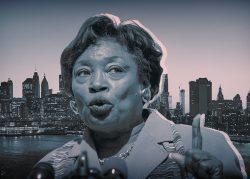Groups representing property owners across New York State say their livelihood is at stake as lawmakers make a push for a blanket eviction moratorium.
The Coalition of New York State Housing Providers penned an open letter to lawmakers Wednesday, pleading with them to not pass a bill which would put a blanket ban on evictions for a year after the pandemic concluded. The group includes Small Property Owners of New York, the New York Capital Region Apartment Association, New York Landlords, the Under One Roof coalition, the New York Chinese Property Owners Alliance and Property Owners Association of Greater New York.
The Rent Stabilization Association, which represents 25,000 landlords in New York City, spoke in support of the open letter, urging lawmakers to not back a bill which would put a greater financial burden on property owners.
Legislation currently on the table, sponsored by state Sen. Zellnor Myrie, would prevent all eviction and foreclosure filings for commercial and residential tenants until a year after any part of Gov. Andrew Cuomo’s statewide disaster emergency is still in place. It has not progressed since the summer, but members of the state Senate said earlier this week they are ready to pass such a measure. Legislative sources say a deal on evictions may materialize as early as today.
But, the groups argue, Myrie’s legislation does not address the “core issue” of tenants being unable to pay rent. The letter also criticizes the legislation for not having sufficient protections in place for landlords.
Read more


“Although the bill does prohibit lenders from foreclosing, the bill does not protect property owners from other foreseeable downstream effects,” such as growing debt, and the potential consequences of delinquent property taxes and utility bills, the groups wrote.
Rather than a blanket ban on evictions, landlords have advocated for limits on evictions that use a targeted, means-tested approach to protect those on the verge of homelessness. Such a ban could incite renters to not pay their rent, the letter argues. Joseph Strasburg, president of the RSA, said that the limits on evictions which are currently in place have led to “mounting untenable debt.”
“It has created an environment in which tenants are taking advantage [and] not paying the rent even when they have the means to do so,” said Strasburg.
The current limits on evictions arise from an executive order issued by Gov. Andrew Cuomo, which extended legislation to allow landlords to pursue money judgments rather than evictions for non-payment cases. The Real Estate Board of New York voiced its support earlier this week for an extension of those existing limits.
Multifamily assets have seen very low levels of distress during the pandemic, despite calls early on urging tenants to withhold rent. Even with varying levels of eviction bans in place, the majority of renters have continued to pay rent. That could change, however, especially if there are more state-mandated lockdowns that keep people from earning money.
Already, there are signs that even in market-rate apartments, the payment rate is slipping. A national lobby group representing landlords reported the lowest rent payment level in December since the beginning of the pandemic.
Distressed properties arising from non-payment of rent could destabilize communities, the letter reads, and it warns that large investors are poised to swoop in and buy such properties.
“The next owner is most likely to be a larger institutional speculative investor,” which would change the relationship between the property owner and the tenant, as well as disrupt the “fabric of the community,” the groups wrote.
